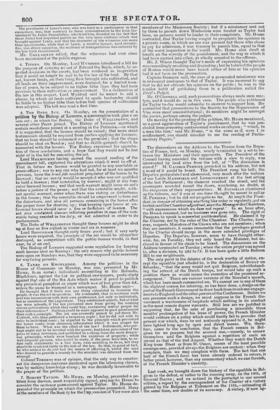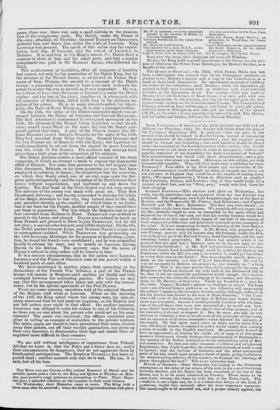Last week, we brought down the history of the squabble
in Bel- gium to the defeat, or rather to the running away, on the 10th, of General DAINE ; and we noticed in the postscript to our second edition, a report by the correspondent of the Courier of a victory gained by the Belgians at Tirlemont on the 11th,— intimating at
pears, there was : there was only a small mistake in the designa- tion of the conquering party. The Dutch, under the Prince of
ORANGE, attacked, on Thursday, General TIEKEN DE TERHOVEN, defeated him, and drove him under the walls of Louvain. King LEoPoLD was present. The result of this action was the capitu- lation, next day, of Louvain, and the retreat of LEOPOLD to Malines. It is said that in the King's retreat, the Dutch fired a number of shots at him and his small party„ and that a Similar compliment was paid to Sir ROBERT ADAIR, who followed the King:
This continuance of hostilities, after all purposes of hostility had ceased, not only by the concession of the Dutch King, but by
the advance of' the French forces, is attributed to Prince BER- NARD of Saxe Weimar, the second in command of the Dutch troops ; a personage who seems to have been most zealously dis-
posed to render the war as hateful as it was imprudent. He was, we believe, to have been Governor of Luxemburg under the Dutch rtg•itne: and the loss of his place, together (it is whispered) with
the stimulus of Schiedam, added fresh fury to the ordinary im- pulses of his valour. He is in many accounts called, but impro- perly, the Duke of SAXE WEIMAR ; he is only a younger brother. On the 13th, the order of the Dutch homeward march was ar- ranged between the Prince of ORANGE and General BELLIARD.
The first detachment commenced its retrograde movement on the 14th; the advance of the French being regulated so that its ad- vance should reach Diest on the same day that the Dutch rear- guard quitted that town. A part of the French troops (the Or-
leans Hussars) passed through Brussels on the night of the 11th. They had marched from Mons that clay. General GERARD and the two Princes are at Brussels with the King; but LEOPOLD in- tends immediately to set out from the capital to scour Limburg and the whole of the frontier. His coolness and courage have given him a high place in the estimation of his subjects.
The Belgic journals contain a demi-official account of the short campaign, in which an attempt is made to explain the disgraceful affair at Hasselt. For some time previous to the 2nd August, says this document, Belgium, so far from preparing tbr war, had been employed in reducing its forces ; the declaration that the armistice, on which they firmly relied, was at an end, came upon the Bel- gians quite unexpectedly ; and the irruption of the Dutch found their forces without organization, and scattered up and down the frontier. The first band of the Civic Guard was not even armed.
The advance of the enemy was made with great art. They first threatened Antwerp ; and having succeeded in drawing the whole
of the Belgic attention to that city, they turned short to the left,
and marched directly on the capital ; of which there is no doubt, had it not been for the French, another couple of days would have
put them in possession. The line which the Belgians had to pro-
tect extended from Malines to Diest. TERHOVEN was ordered to, march to the Lierre, and obeyed. DAINE was ordered to break up from Hasselt and proceed to Diest to join TERHOVEN, but he did
not obey ; a second order was sent, and still he stuck fast. On the 9th, the Dutch pushed towards Liege, and General DAtivE's corps was
in consequence isolated. When TERHOVEN was proceeding on
the lOth to occupy Montaign, for the purpose of facilitating a junc- tion, he found his friends were annihilated ; and he was compelled
hastily to retrace his steps, and to march on Louvain, leaving DAINE to his destiny. The account says, that the cause of DAINE'S refusal to obey orders will be known in time.
It is a curious circumstance, that in the action near Louvain, LEOPOLD and the Prince of ORANGE were at one period within a hundred yards of each other.
We have mentioned in another place, that, according to the declaration of the French War Minister, a part of the French troops will remain in Belgium until matters are finally and fully arranged between the contending parties. 'We believe we may say, that this arrangement takes place. not only with the concur- rence, but by the special agreement of the Five Powers. There are some amusing anecdotes told of the admired disorder of the Belgian staff while at Louvain. When on the morning
of the 11th the King asked where the enemy were, his aide-de- camp answered that he had made no inquiries, as his Majesty had not left orders over night to that effect. On another occasion, LEOPOLD was obliged to write his orders to one of his Colonels, as there was no one about his person who could act as his ama- nuensis! The panic was universal ; the officers emulated each other in_ setting an example of cowardice to the private soldiers. The latter, again, are stated to have abandoned their arms, thrown away their jackets, cut off their warlike mustachios, nay given up their very breeches, to disencumber their legs and render their re- cognition more difficult to their enemies.



























 Previous page
Previous page